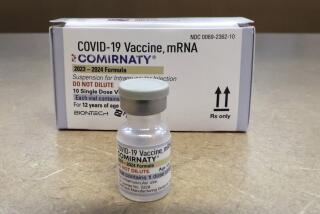Group Urges Mammograms Yearly in 40s
- Share via
WASHINGTON — The American Cancer Society on Sunday recommended that women in their 40s undergo routine annual mammograms, a move that will further accelerate the ongoing national debate over what in recent years has become one of the most volatile issues in modern medicine.
The action represented a change from the society’s current recommendation, which is that women in this age group have mammograms every one to two years.
It also presaged an announcement expected Thursday from the National Cancer Institute, which is expected to return to its pre-1993 position of urging routine screenings every one to two years for women ages 40 to 49.
The institute has been under heavy pressure from Congress, the medical community and others to reverse itself. Its National Cancer Advisory Board--a panel of outside experts that advises the institute--has been reexamining the issue in light of additional research.
In a phone interview Sunday night, Dr. Richard Klausner, the director of the cancer institute--which is part of the National Institutes of Health--refused to elaborate on the coming recommendations, saying only:
“I do not think that the recommendations of the [National Cancer Advisory] board and the recommendation of the American Cancer Society will be significantly at odds. I think they will be very compatible.”
Klausner said the cancer institute would continue to work very closely with the cancer society “to create and disseminate education information, and address many of the issues surrounding mammography.
“I’m looking forward to getting this settled and moving on,” Klausner added. “I think that what we will say on Thursday will be clear and helpful and is something we all are comfortable reflects the current evidence.”
The National Cancer Institute and the American Cancer Society are regarded as the two most influential cancer policymaking bodies in the nation.
The cancer society’s changed recommendation is intended to ease the pressure and confusion on women in their 40s who do not know what to do, said Dr. Myles P. Cunningham, society president.
“We are confident that these guidelines will save lives,” he said. “We think women need specific guidance, and if there is a specific benefit, we should say so.”
The society’s board of directors agreed to the new guideline Saturday and announced it Sunday during a science writers seminar sponsored by the society.
The issue has been one of the most hotly argued in medicine in recent years and was further fueled by a report issued by a federal advisory panel in January recommending that women 40 to 49 make their own decisions about what to do.
That panel’s conclusion came despite new data showing reduced breast cancer death rates among women 40 to 49 who undergo regular mammograms. It was immediately challenged by Klausner, who asked the institute’s advisory board to take a look. It is their recommendations that are scheduled to be issued later this week, becoming the policy of the institute.
The issue of whether women 40 to 49 should have regular mammograms has been the subject of an intense national debate since 1993, after a series of studies indicated there was no decrease in mortality rates among women of those ages who received them.
This was in sharp contrast to dramatic declines in death rates of women 50 and older. In that group, studies have shown consistently and indisputably that death rates are reduced by at least one-third in women having mammograms.
The disparity prompted the institute to drop its recommendation that the younger-aged women routinely undergo the tests and provoked heavy criticism and deep divisions within the cancer community.
Breast cancer is the most commonly occurring cancer in women and the second-leading cancer killer, after lung cancer--although it is the single-leading cause of death for women 40 to 49.
This year, an estimated 180,200 new cases of breast cancer will be diagnosed, and there will be 43,900 deaths among women whose breast cancers were detected earlier. Breast cancer risk increases with age, particularly after 60.
The entire scientific community agrees that women younger than 40 do not routinely need mammograms and that women 50 and older should have them annually.
More to Read
Sign up for Essential California
The most important California stories and recommendations in your inbox every morning.
You may occasionally receive promotional content from the Los Angeles Times.













